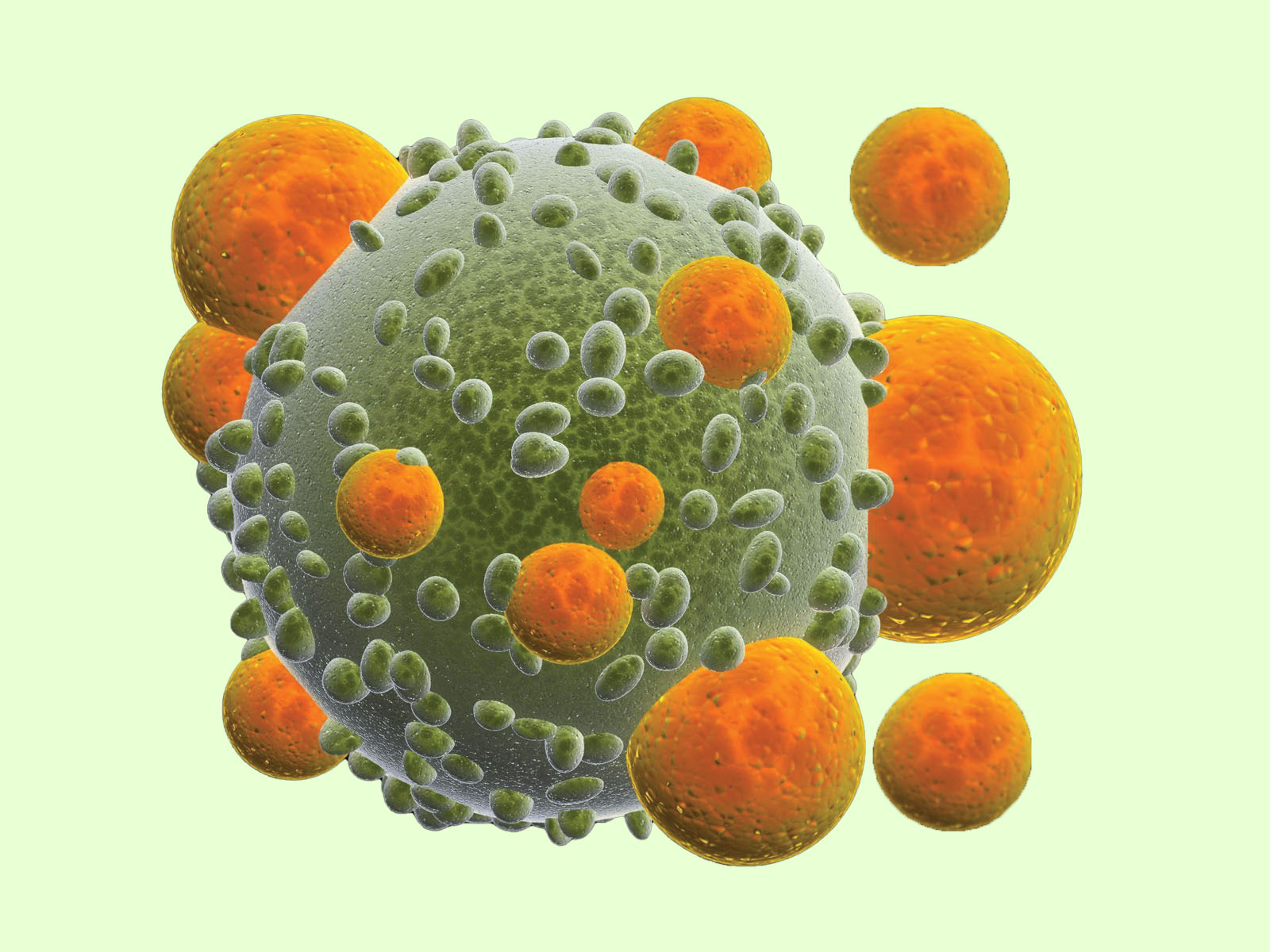
Issue 46
May 2023
IN VIVO
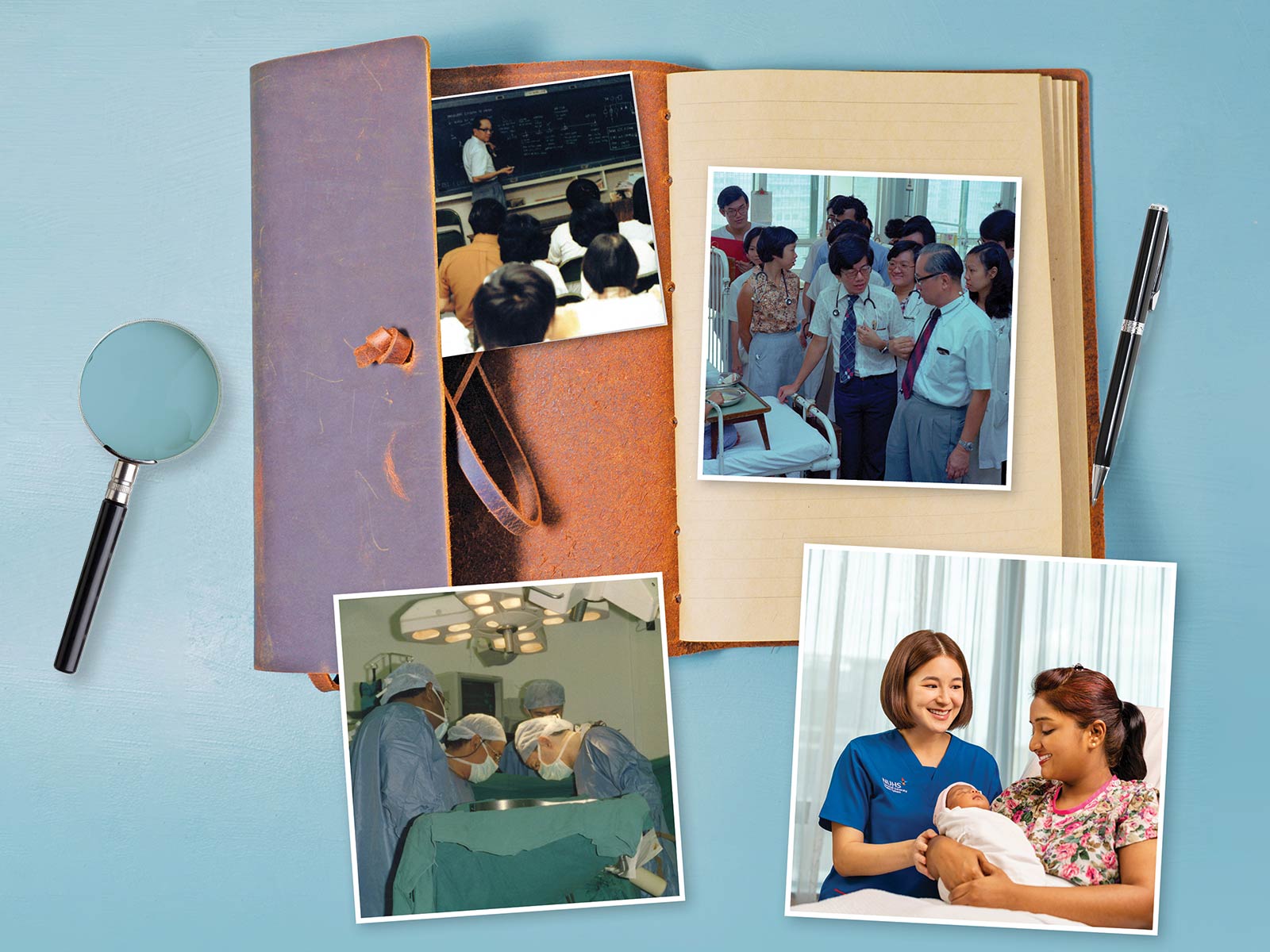
Remembering our roots
Our Beginnings
The history of our paediatric services dates back 60 years to 1962 and the Mistri Wing at the Singapore General Hospital (SGH), where the University of Singapore medical school established the Department of Paediatrics. The four-storey paediatric wing, named after its donor, N.R. Mistri, had eight wards with 280 beds/cots.
Located in the Mistri Wing’s west wing, the department was popularly known as Paediatric West and occupied half of the wards, namely Wards 26, 28, 30 and 32. It was led by Emeritus Professor Wong Hock Boon, the Founding Professor of Paediatrics.
In the early days at Mistri Wing, the number of paediatricians was limited. All the doctors were thus trained as general paediatricians. However, as the standard of care improved and expectations from the patients and parents increased, sub-specialties were eventually pioneered in the department.
In 1985, the department moved to the National University Hospital (NUH), which had been newly set up as a teaching hospital to give impetus to medical education in Singapore. Following its move, the department underwent several changes, including a growth in staff strength which allowed the enhancement of paediatric services.
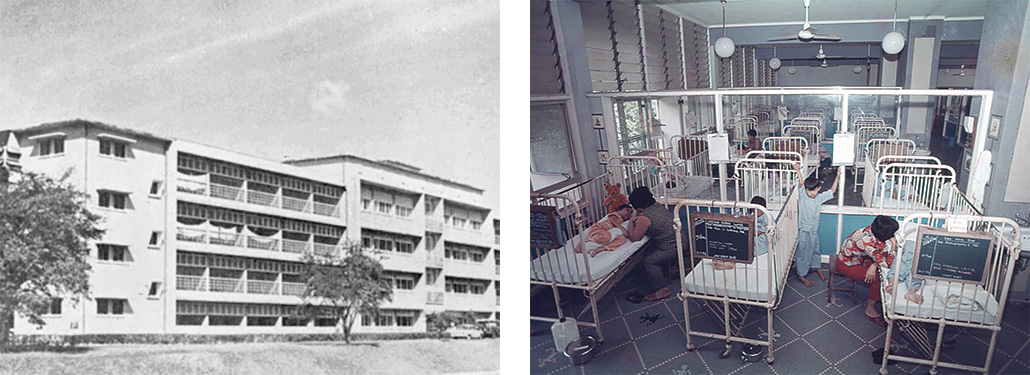
Left: The Mistri Wing at the SGH. Source: Journal of Singapore Paediatric Society
Right: A typical paediatric ward within the wing. Source: The SGH Museum.
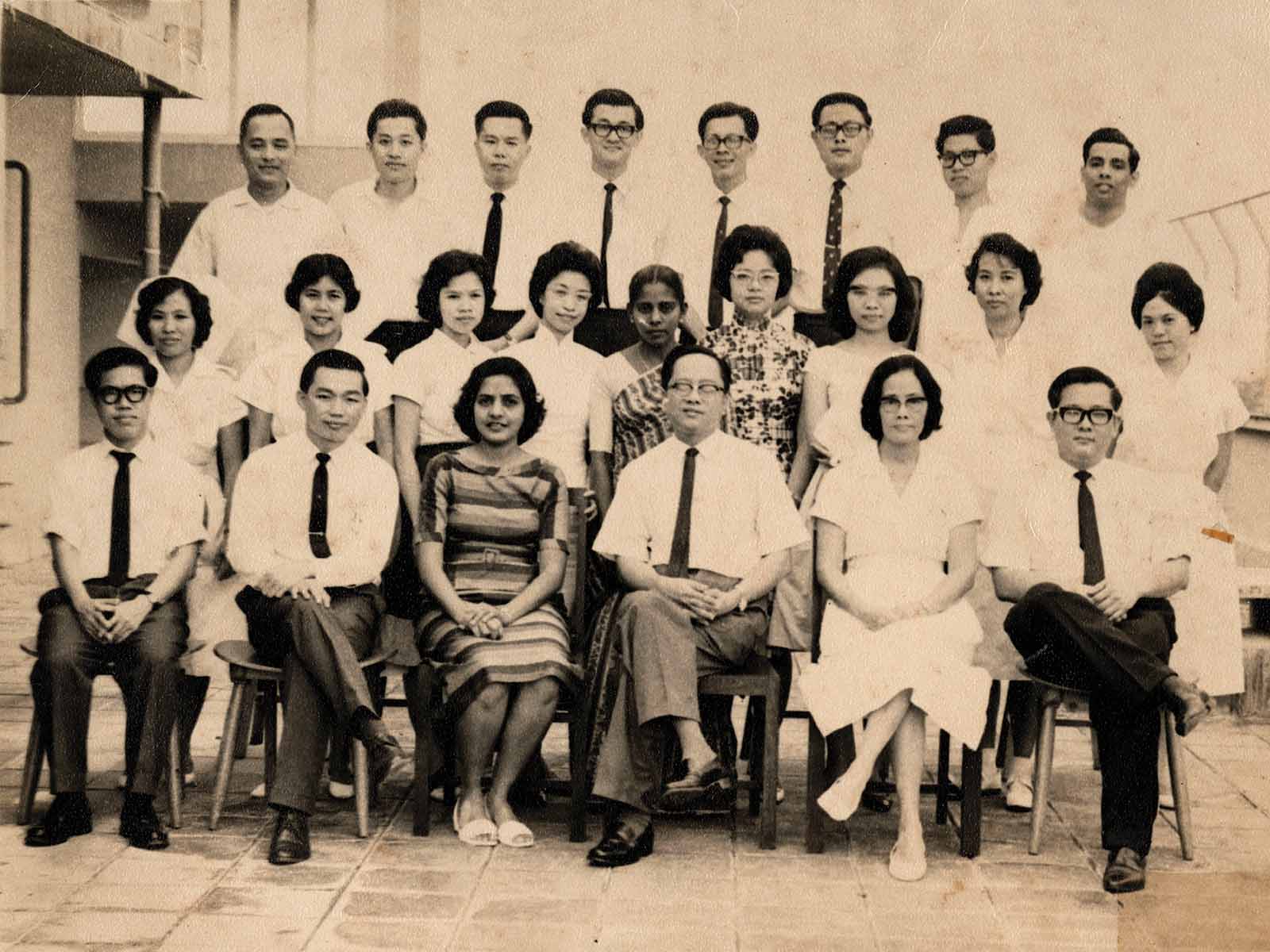
The University Department of Paediatrics led by E/Prof Wong Hock Boon. Source: The SGH Museum.
Our Pioneers
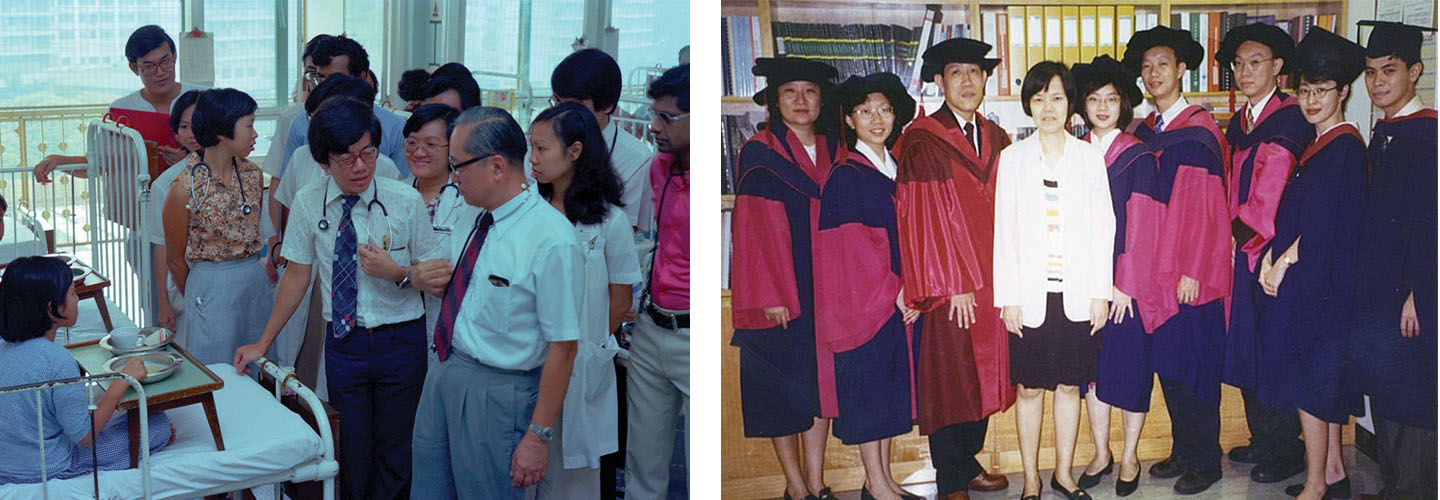
Left: As the only paediatric oncologist back in the day, A/Prof Quah Thuan Chong (centre) was pivotal in the treatment of childhood cancer. He designed the acute lymphoblastic leukaemia (ALL) treatment protocol at NUH, which improved the cure rate of childhood ALL in Singapore from 30% to 62%.
Right: Beneath Prof Low Poh Sim’s (centre) gentle demeanour was a powerful trailblazer who has built a firm foundation for paediatric and paediatric neurology services. She has nurtured and mentored countless paediatricians, many of whom are now established leaders in the profession.
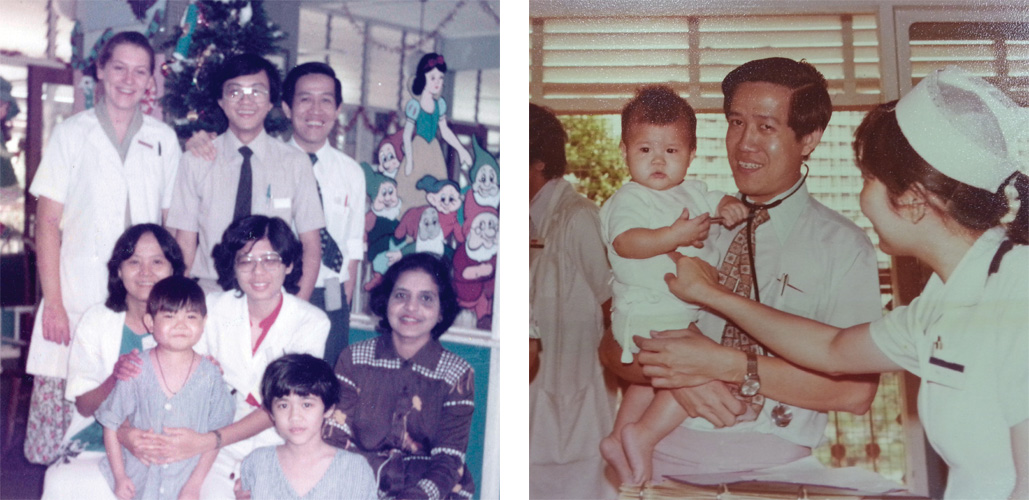
Left: Driven by a single-minded passion to enable chronic kidney patients to lead fulfilling lives, Prof Yap Hui Kim (centre) has dedicated her career to the advancement of paediatric nephrology. Together with a paediatric dialysis nurse, she adapted machines and successfully performed peritoneal dialysis and haemodialysis on her first few patients. Source: The SGH Museum.
Right: Prof Quak Seng Hock (second from right) has played a pivotal role in building up paediatric gastroenterology and hepatology services in Singapore. Under his leadership, major milestones in Singapore and Southeast Asia include pioneering paediatric gastrointestinal endoscopy services, paediatric gastrointestinal motility services and the paediatric liver transplantation programme.
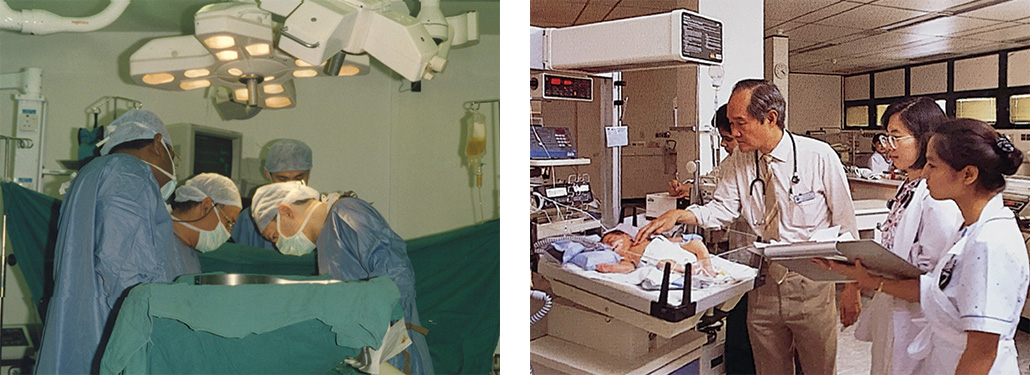
Left: Regarded as the pioneer of paediatric liver transplantation in Singapore, E/Prof Prabhakaran Krishnan (second from left) has had an illustrious career with many firsts in paediatric surgery. He played an instrumental role in establishing the national paediatric kidney and liver transplantation programmes in Singapore, with outcomes comparable to leading centres in the world.
Right: The late Prof Tan Kim Leong championed better healthcare for newborns, which took him beyond the hospital and into the community. In the 1980s, he established an intensive care service for newborns that helped reduce neonatal mortality rates from 16 to five per 1,000 live births over the next two decades.
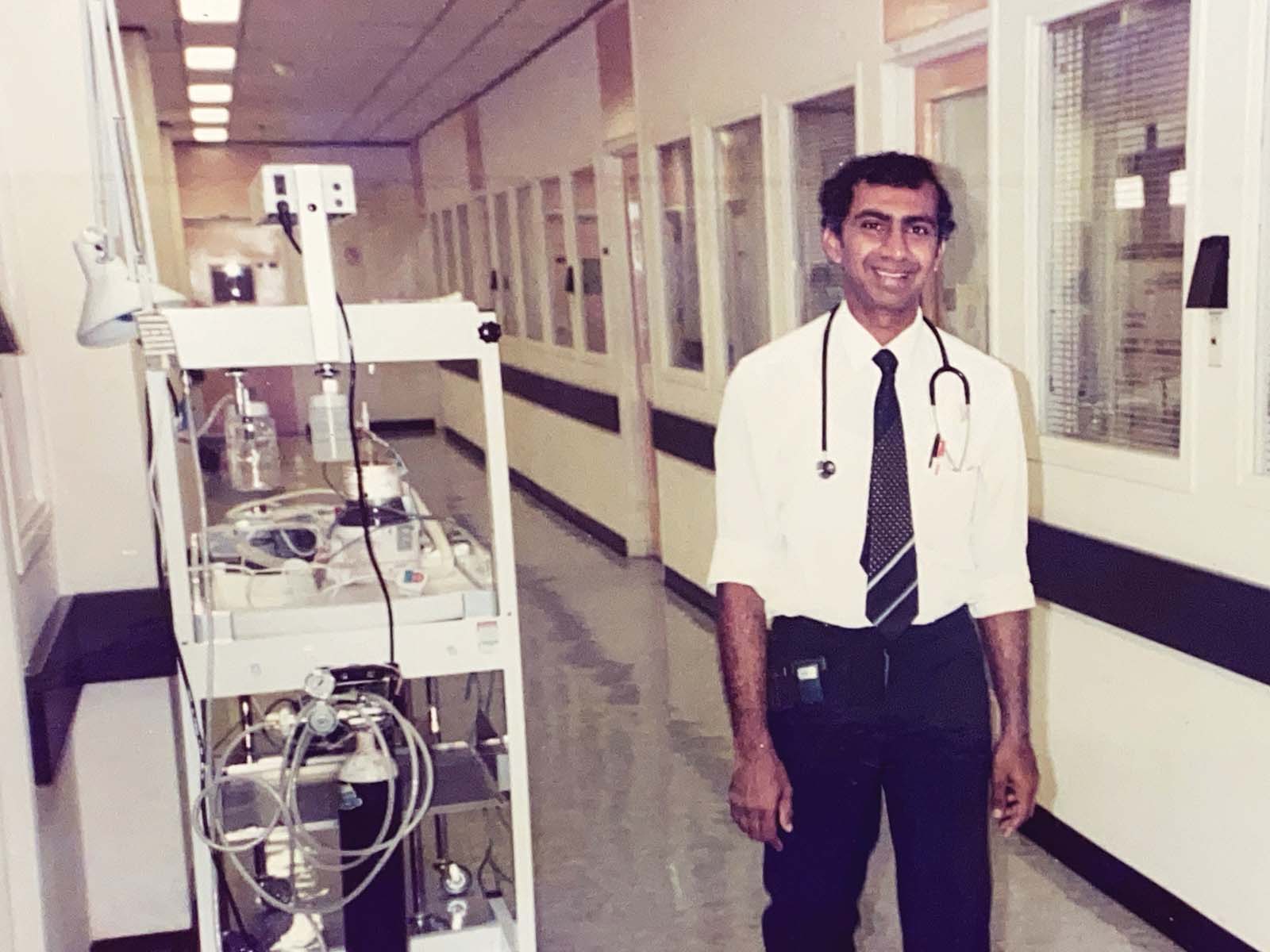
As an astute clinician and researcher, A/Prof Roy Joseph introduced key interventions to the neonatal practice to enable better care for newborns. He pioneered the introduction of transcutaneous screening for severe jaundice in Singapore which greatly improved the care of infants with neonatal jaundice.
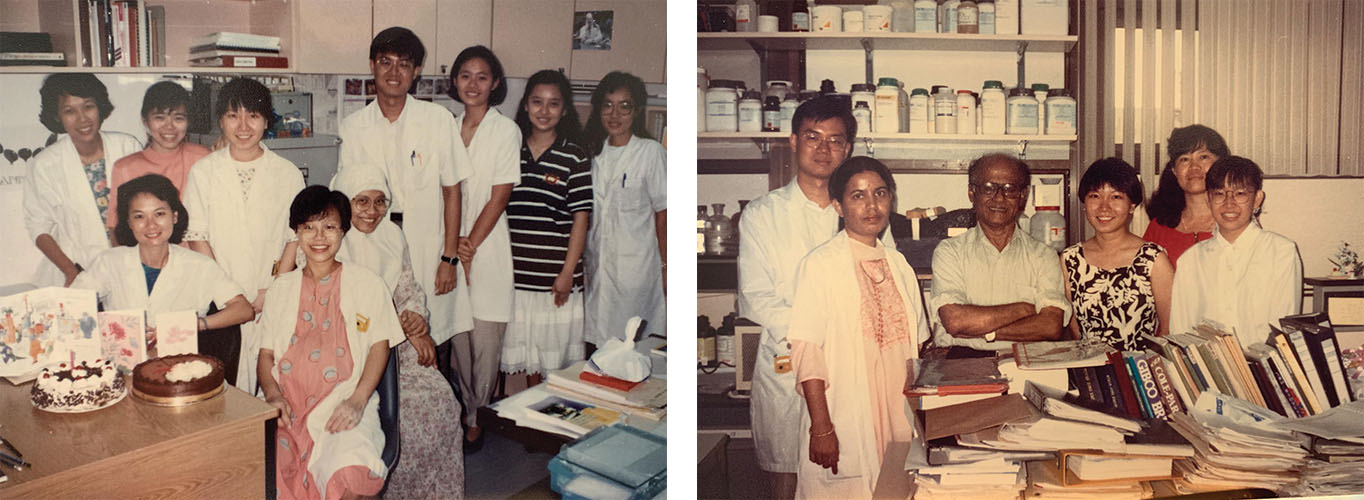
Left: Taking her passion for research in allergy and immunology from bench to bedside led Prof Lee Bee Wah (first from left) to initiate the setup of the first clinical immunology laboratory in Singapore, while also establishing paediatric allergy services at NUH to provide allergy diagnostics for children.
Right: The department’s first research scientist, the late A/Prof Nilmani Saha (centre), was known to think out of the box when the odds were against him. Despite the rough and ready conditions that he had to adapt to back in the day, it did not deter him from making an impact and authoring more than 200 research publications.
A New Era: Khoo Teck Puat – National University Children’s Medical Institute
The paediatric outpatient service, having been expanded over the years, eventually outgrew its physical location at Clinic A on the ground floor of NUH’s main building. In 2019, it relocated to a new outpatient building funded by a generous donation from the Estate of Khoo Teck Puat in 2010.
In recognition of the gift supporting the advancement of paediatric education, research and patient care, the University Children’s Medical Institute was renamed the Khoo Teck Puat – National University Children’s Medical Institute (KTP-NUCMI).
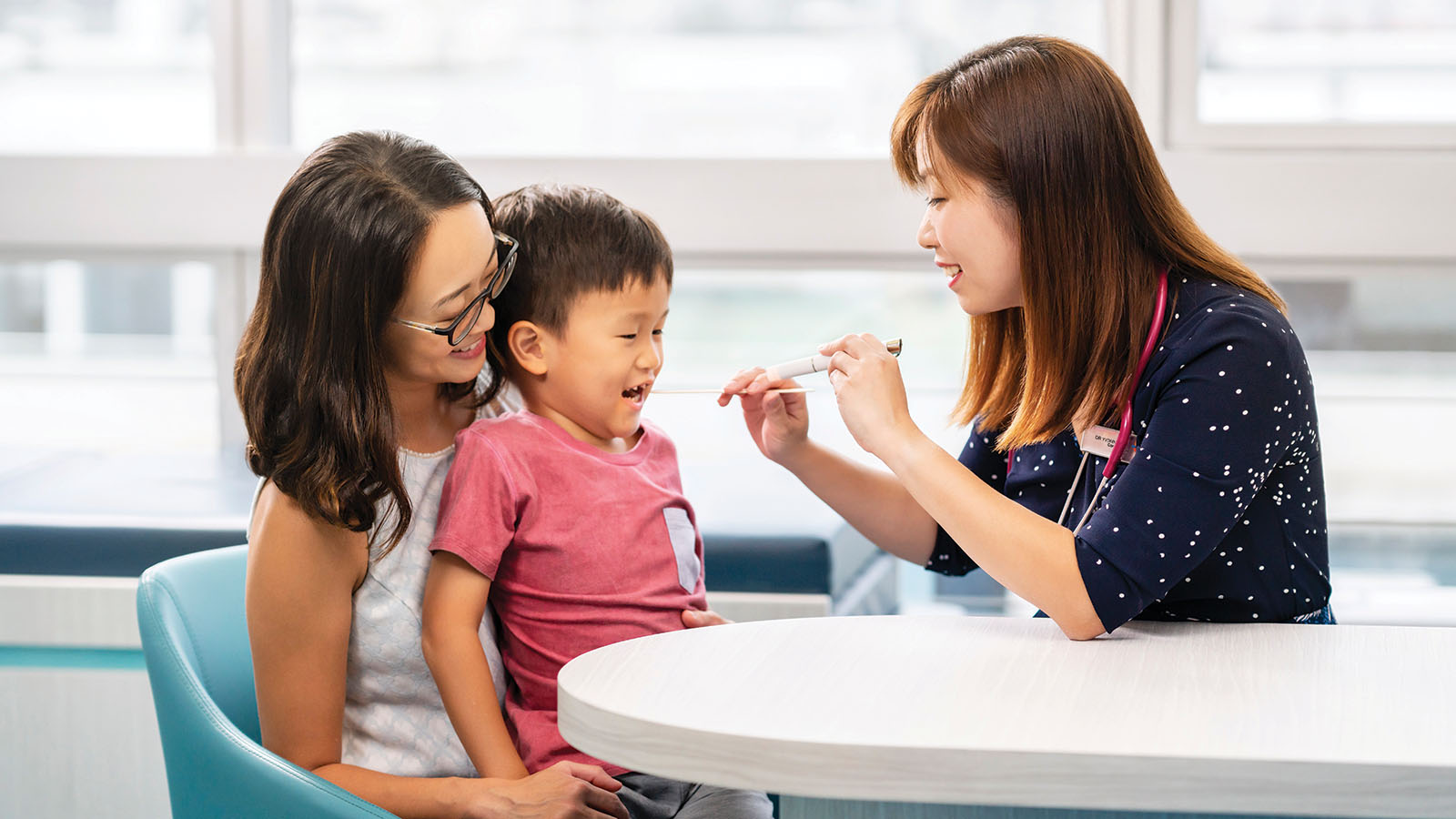
The KTP-NUCMI outpatient facility welcomed its first outpatients in January 2019.
Our Founding Father
Our story is incomplete without acknowledging the remarkable achievements of Emeritus Professor Wong Hock Boon (1923–2008). Affectionately known as the Father of modern Paediatrics in Singapore, he was an outstanding clinician, researcher and teacher, and a passionate advocate of child health who led the Department of Paediatrics for 26 years until his retirement in 1988.
Known as a “walking encyclopaedia”, E/Prof Wong was highly regarded for his unparalleled paediatric knowledge. His published works, including more than 50 volumes of Paediatric Clinical Conference Notes, are testament to his scholarship and even now serve as the go-to sources of information for countless medical students.
E/Prof Wong identified the association between hyperbilirubinaemia, kernicterus and glucose-6-phosphate dehydrogenase (G6PD) deficiency in newborns. Subsequently, he initiated G6PD deficiency screening using cord blood, which has since almost eliminated the incidence of death and permanent disability from severe neonatal jaundice and kernicterus in Singapore. He also discovered three previously unknown hemoglobinopathies, Hb Singapore, Hb J Singapore and Hb J Meerut.
As a strong advocate of breastfeeding, he once remarked, “Cow milk is meant for cows and not for human babies.” In 1974, he organised the Breastfeeding Mothers’ Group and established a breast milk bank in Singapore. His fervent promotion of breastfeeding even earned him the moniker “Mr Breastfeeding”.
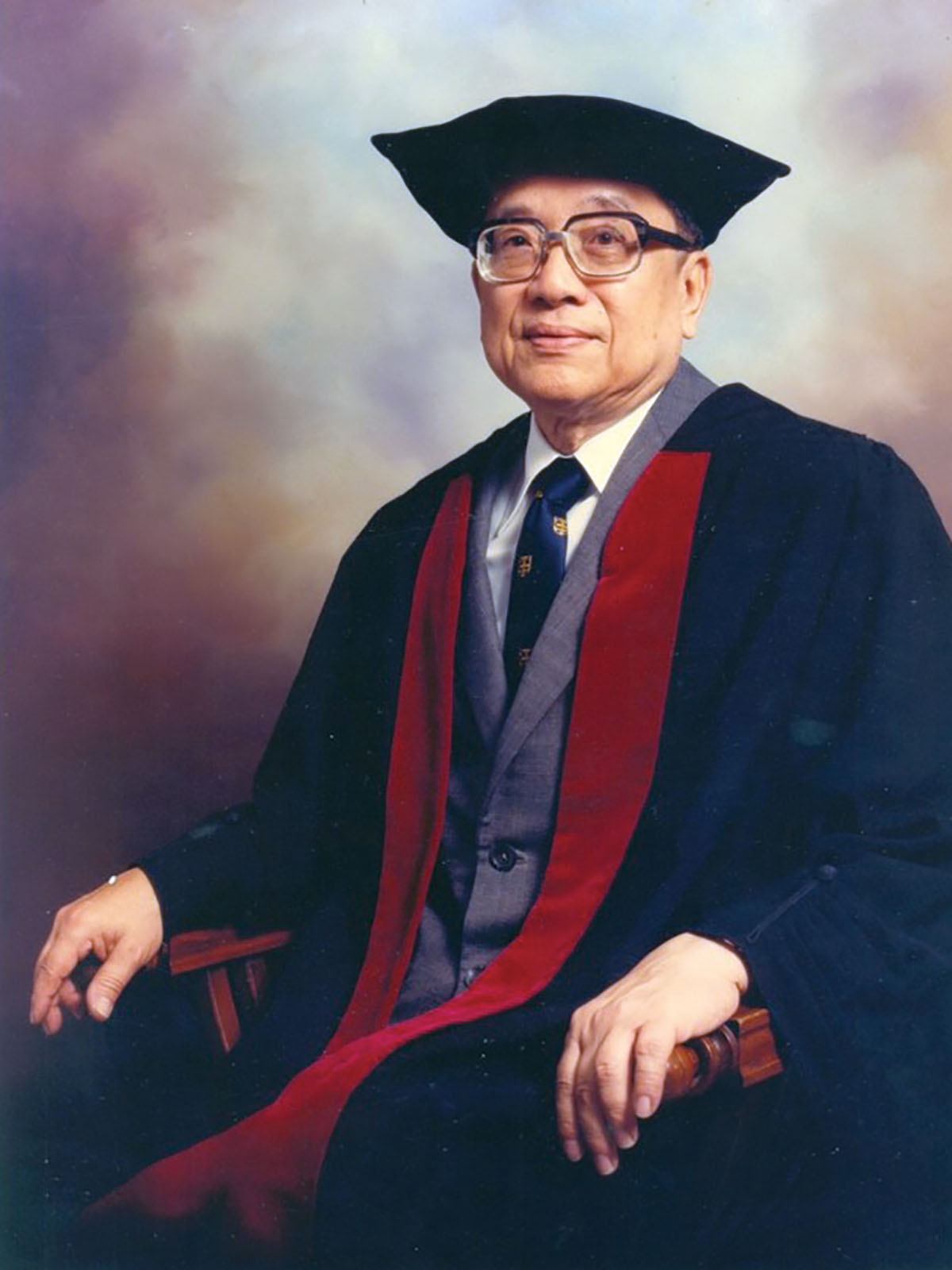
In 1962, E/Prof Wong was promoted from Senior Medical Registrar to be the Founding Professor of Paediatrics at the University of Singapore.
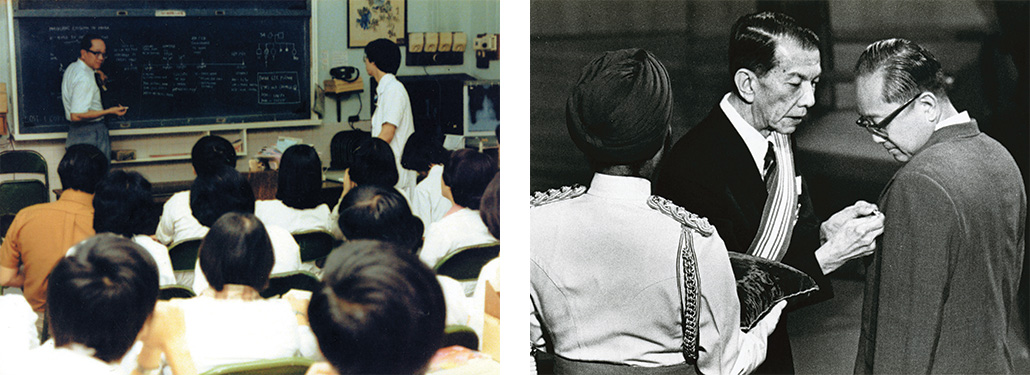
Left: E/Prof Wong imparted his knowledge and experience to a whole generation of paediatricians, especially during his daily ward rounds, weekly tutorials and clinical conferences. Source: The SGH Museum.
Right: One of the many prestigious awards conferred on E/Prof Wong includes the Meritorious Service Medal by the then President of Singapore, Dr Benjamin Sheares, in 1975. Source: The SGH Museum.
For his contributions and achievements, E/Prof Wong was accorded the highest honours, including the Most Outstanding Paediatrician in Asia (from the Association of Paediatric Societies of the South East Asian Region); Public Administration Gold Medal; Meritorious Service Medal; Guinness Award for Scientific Achievement; the inaugural National Science and Technology Award; and Emeritus Professorship from the National University of Singapore.
Looking ahead
The paediatric healthcare landscape is ever-evolving. It is imperative that we continually innovate and improve upon our services and programmes to meet the growing health needs of the young.
KTP-NUCMI strives to continue the legacy of advancing child health, and eventually women and maternal wellness, through progressive clinical care, research and education.
Healthy Start to a Healthier Life
Many non-communicable diseases have their origins in early childhood, and the intrauterine and immediate postnatal periods. To enable Singaporeans to live healthier longer, the National University Centre for Women and Children (NUWoC) was instituted. NUWoC integrates the Department of Obstetrics & Gynaecology (O&G) and KTP-NUCMI as a cluster centre.
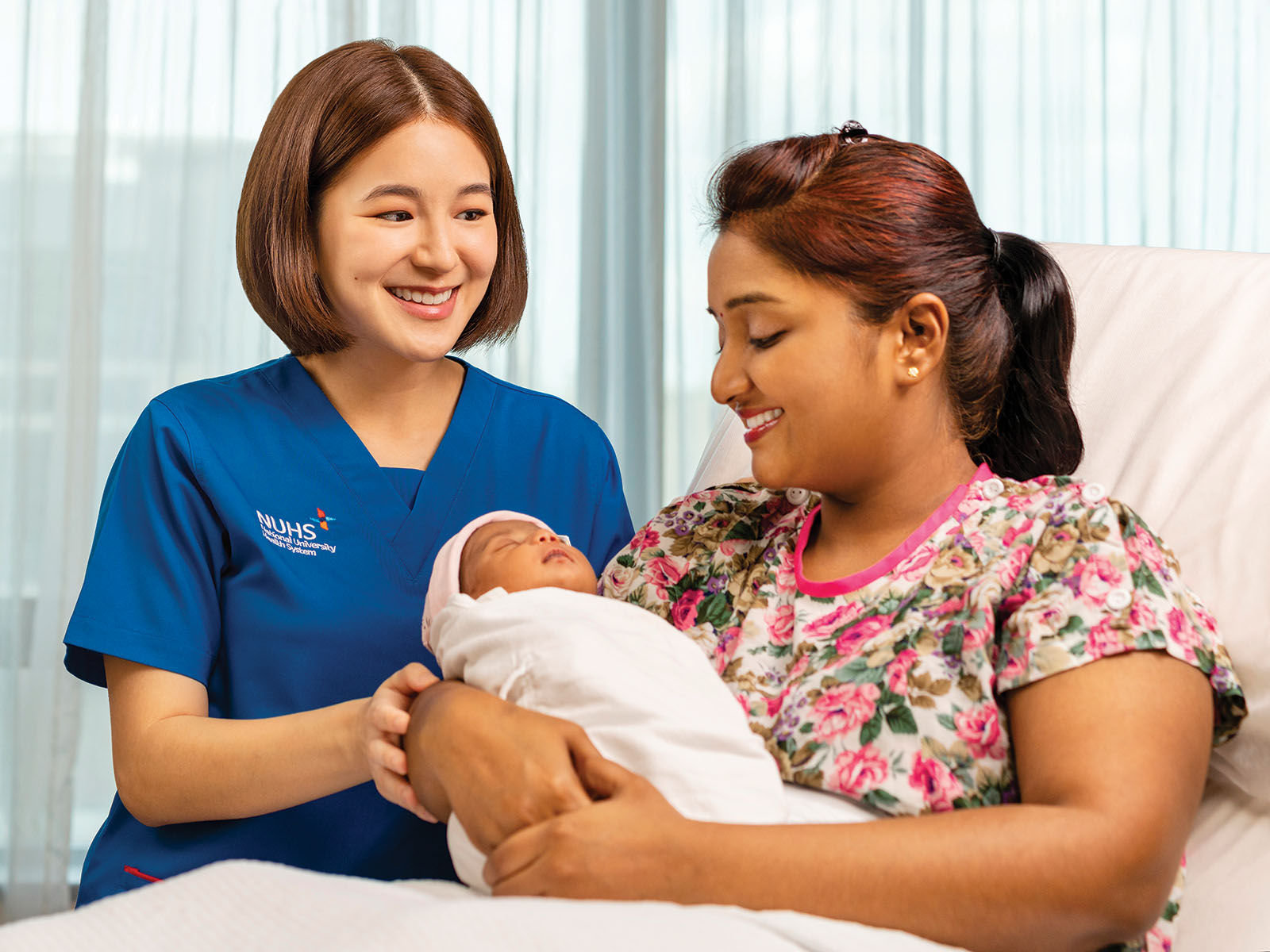
NUWoC’s mission is to empower women, children and their families in leading healthier lives. in women and children’s health so that every person can achieve their fullest human potential.
NUWoC aims to deliver the life-course continuum of care for Singapore’s women and children, particularly in the western region. It focuses on the right-siting of appropriate services in the community and builds complementary services based on the National University Health System’s (NUHS) strengths and centres of excellence. NUH provides tertiary and complex multidisciplinary care for women and children; Ng Teng Fong General Hospital and Alexandra Hospital provide acute, secondary and step-down care; Jurong Medical Centre provides satellite outpatient services in child development, obstetrics and gynaecology. In addition, a network of children’s urgent care clinics provides acute but non-emergency paediatric care.
With the National University Polyclinics (NUP) and NUHS Regional Health System (RHS), NUWoC provides primary care, preventive screening, health promotion, disease prevention and community support for women and children. It will also include services for high-risk pregnancies, medical genetics, fetal therapy, complex neonatal care, fertility preservation, adolescent girls’ health and reproductive ageing.
A Chance at Life
More than 10 years ago, children with leukaemia who did not respond to chemotherapy had few or no other treatment options and faced imminent death. At the turn of the century, scientists began researching alternative ways to fight cancer. Among them was Professor Dario Campana from St. Jude Children’s Research Hospital in the US. He sought to harness the power of the immune system by developing chimeric antigen receptor (CAR)-T cells. Since then, CAR-T cell therapy has revolutionised immunotherapy and the treatment of B-acute lymphoblastic leukaemia (B-ALL), the most common childhood cancer worldwide.
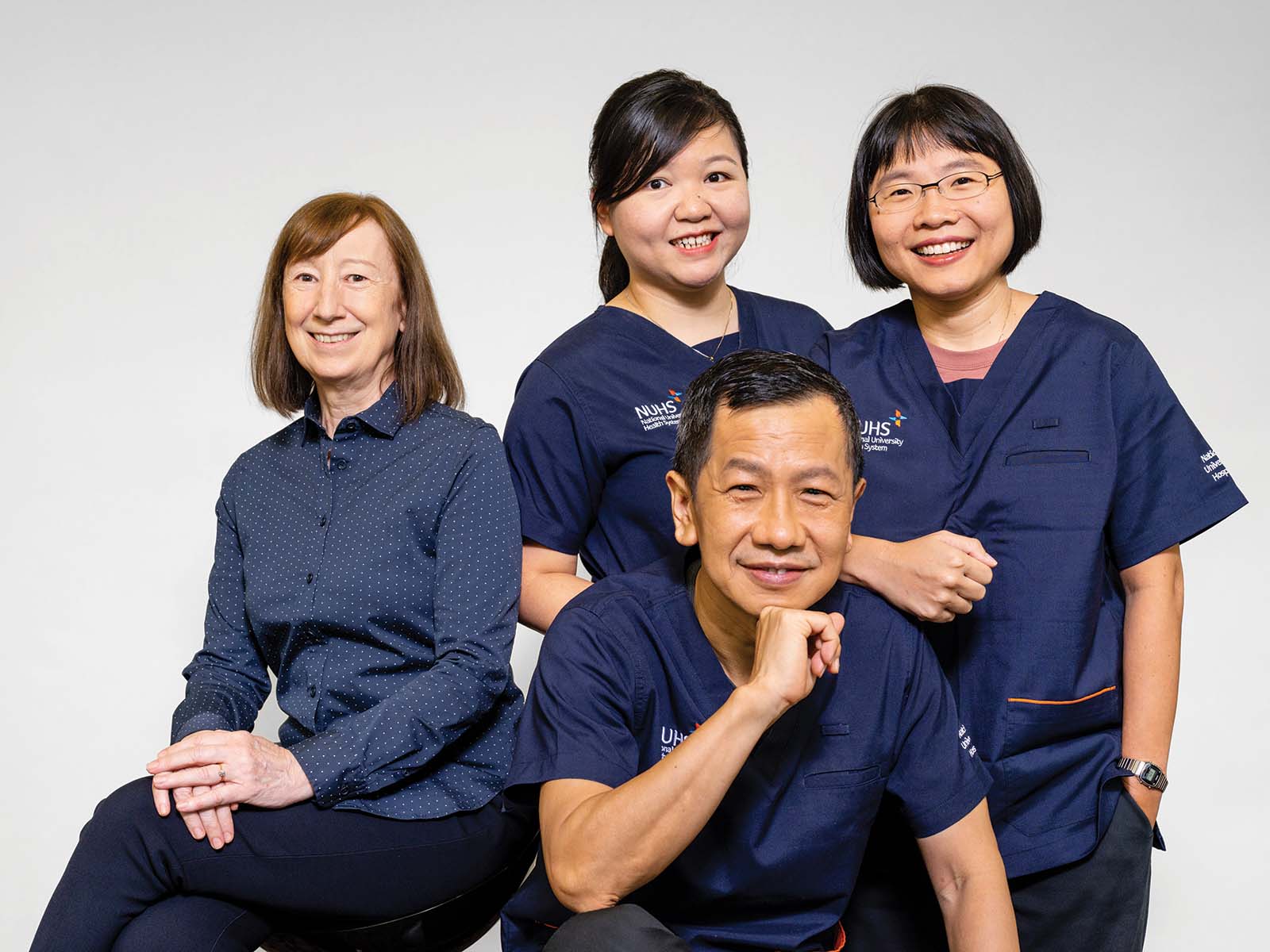
The CAR-T team (clockwise from left): Principal research scientist, Dr Elaine Coustan-Smith, Dr Bernice Oh, Dr Esther Chan from the National University Cancer Institute and A/Prof Allen Yeoh.
Prof Campana first established the advanced cellular therapy programme in 2011 when he moved to Singapore to join the Department of Paediatrics at the NUS Yong Loo Lin School of Medicine. From multiple early-phase clinical trials involving natural killer cells to the more recently ALaCART and CARTALL clinical trials in 2021, the team is well-recognised as an established cellular therapy unit locally and beyond. Together with the clinical team led by Associate Professor Allen Yeoh, Head and Senior Consultant of the Division of Paediatric Haematology and Oncology, the team has gained considerable clinical experience as the first group to launch paediatric CAR-T cell therapy clinical trials in Singapore and the region.
In recognition of his work as one of the pioneers and world experts in CAR-T cell therapy, Prof Campana was awarded the prestigious Jacob and Louise Gabbay Award in Biotechnology and Medicine in 2019 and the Singapore President’s Technology Award in 2020. He continues to lead the team in pushing boundaries for patients with otherwise incurable cancers.
Upskilling for the Future
To meet the changing needs, expectations and demands of child and youth healthcare, the Department of Paediatrics has developed Continuing Education and Training (CET) programmes to support the lifelong learning of practitioners who are keen to reskill and upskill.
Graduate Diploma in Child and Adolescent Health (GDCAH)
With primary care delivery evolving to emphasise family-focused and community-based practices, there is a need to support the CET of physicians practising in primary healthcare who are keen to upskill in the management of child and youth health.
Offered as part of the NUS School of Continuing and Lifelong Education (NUS-SCALE) and supported by Singapore SkillsFuture, the inaugural GDCAH was launched on 6 August 2022. The programme incorporates the three core elements of primary care—comprehensive care, continuity of care and coordination of care.
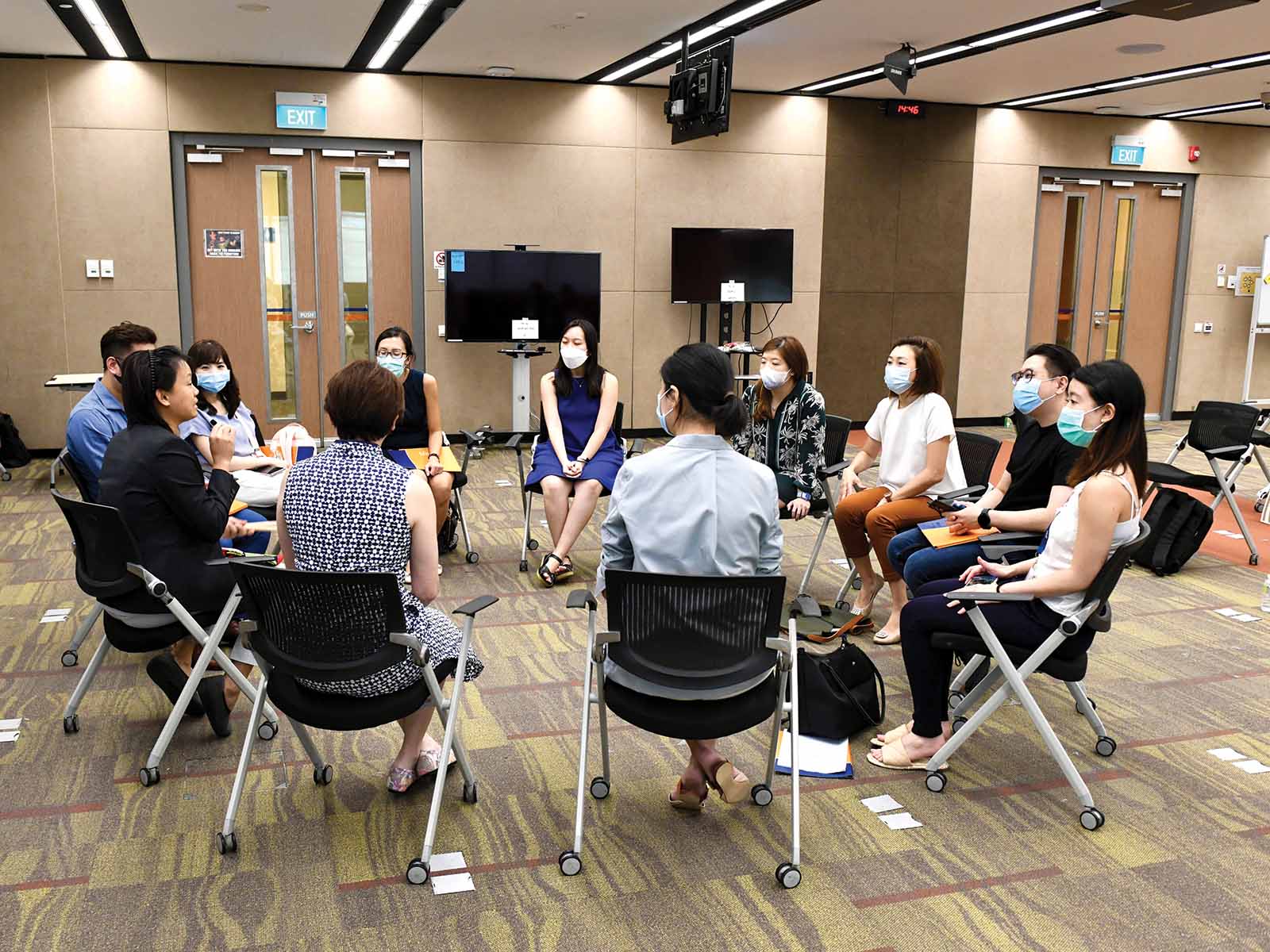
Students of the inaugural class of the GDCAH bonding through an activity.
Early Childhood Development: The Touchpoints Approach
Also offered as part of NUS-SCALE and supported by Singapore SkillsFuture, the Brazelton Touchpoints Individual Level Training course was launched in October 2020 to support the CET of early childhood educators. Taught by an interprofessional team comprising developmental paediatricians, specialist nurses and social workers, this course highlights the key role of inter-professional education and collaboration in supporting early childhood development.
Brazelton Touchpoints is an established evidence-based programme in the US that focuses on building strong family-child relationships before birth through the earliest years, which are vital for children’s early learning and healthy development.
Intensive Paediatric Revision Course for Master of Medicine (MMed) in Family Medicine
As a part of the department’s efforts to support family practice specialists’ professional development, the department has offered an intensive revision course for physicians preparing for MMed (Family Medicine) since 2004. Held over four Saturday afternoons, it prepares physicians for the paediatric component of the clinical examinations. In 2020, the course moved online due to COVID-19, serving the largest cohort of 84 learners since its inception.
Click here to access the full 60 Years of Child Health Commemorative book.
KTP-NUCMI is committed to journeying with patients and their families, providing quality, holistic care while pushing the boundaries of medicine for the advancement of child health.
The African proverb, ‘It takes a village to raise a child’, resonates with us, bringing us together as a community to serve with purpose every day for the past 60 years and hopefully many more.
More from this issue


